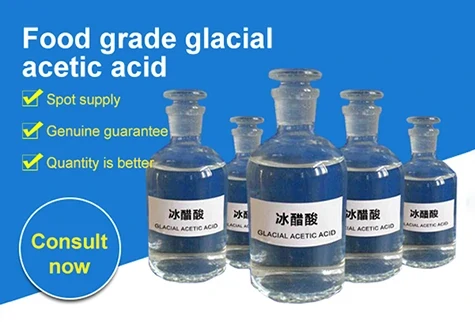
Aug . 11, 2024 11:32 Back to list
Understanding the Properties and Applications of Solid Glacial Acetic Acid in Various Industries
Understanding Glacial Acetic Acid Properties and Applications
Glacial acetic acid, chemically represented as CH₃COOH, is a colorless, pungent liquid with a distinctive smell reminiscent of vinegar. It is referred to as glacial due to its ability to solidify at temperatures below 16.6 degrees Celsius (62 degrees Fahrenheit), forming crystalline structures that resemble ice. This unique characteristic not only distinguishes glacial acetic acid from its diluted counterpart but also gives it practical significance in various industrial and laboratory applications.
Physical Properties
The primary feature of glacial acetic acid is its high purity level, usually around 99–100%. In its solid state, glacial acetic acid appears as white crystalline needles, which can be produced through the cooling and solidification of its liquid form. When heated, it can release vapors that are corrosive and can cause severe irritation to the respiratory system, eyes, and skin. Therefore, safety precautions are crucial when handling this chemical, including the use of personal protective equipment (PPE) such as gloves, goggles, and appropriate clothing.
In addition to its physical state, glacial acetic acid has a relatively high boiling point of 118.1 degrees Celsius (244.58 degrees Fahrenheit) compared to other simple carboxylic acids. Its high acidity, with a pKa of approximately 4.76, makes it a strong acid in its concentrated form. This property allows glacial acetic acid to donate protons readily, making it a vital reagent in various chemical reactions.
Chemical Reactions and Uses
Glacial acetic acid is an essential chemical intermediary in producing a wide array of products. One of its primary uses is in the synthesis of vinyl acetate, which is a key ingredient in producing polymers and adhesives. These polymers find applications in paints, coatings, and textiles. Moreover, glacial acetic acid acts as a solvent and a reagent in numerous reactions, including esterification and acetylation processes.
glacial acetic acid solid

In the pharmaceutical industry, glacial acetic acid is instrumental in manufacturing various medications, including analgesics and anti-inflammatory drugs. Its role as a solvent enables the effective dissolution of different compounds, aiding in the development of effective drug formulations. Additionally, it is utilized in the production of chemicals like acetic anhydride, which is fundamental in the manufacture of cellulose acetate used in photographic films and textiles.
Environmental and Safety Considerations
While glacial acetic acid has numerous applications, it is important to recognize its potential hazards. Its corrosive nature means that it can cause severe burns upon contact with skin or mucous membranes. Prolonged exposure to its vapors can lead to respiratory issues and harm to bodily tissues. Consequently, industries handling glacial acetic acid must adhere to strict safety protocols, including proper ventilation, the use of explosion-proof equipment, and appropriate waste disposal methods.
From an environmental standpoint, acetic acid is biodegradable, and its use in controlled amounts does not pose significant ecological threats. Nevertheless, spills or excessive discharge into water bodies can disrupt aquatic life, emphasizing the importance of responsible use and regulation.
Conclusion
Glacial acetic acid is a vital chemical compound with diverse applications across various industries. Its unique properties, coupled with a wide range of uses, illustrate its significance in modern chemistry and manufacturing. However, safety and environmental considerations must be prioritized to mitigate the risks associated with its use. Understanding glacial acetic acid’s characteristics and applications can facilitate informed usage, ensuring both industrial productivity and safety. As we continue to explore and harness the potential of this versatile compound, responsible management will be key to leveraging its benefits effectively.
-
SmartAgri Solutions - Precision Farming&Soil Monitoring
NewsJul.13,2025
-
Industrial Solutions-Example Inc.|Smart Manufacturing&Energy Efficiency
NewsJul.13,2025
-
Food Grade Glacial Acetic Acid-Pure Quality|High-Purity Acetic Acid,Food-Grade Chemical
NewsJul.13,2025
-
Industrial Efficiency Solutions-NextGen Technologies|Advanced Automation&Data-Driven Analytics
NewsJul.12,2025
-
Smart Manufacturing Solutions-Example.com|Enhance Efficiency&Reduce Costs
NewsJul.12,2025
-
Food grade glacial acetic acid
NewsMar.07,2025
